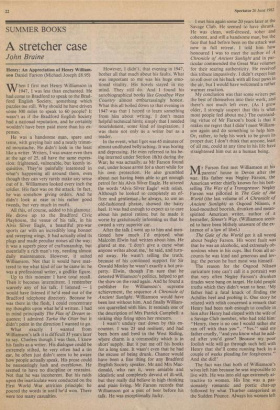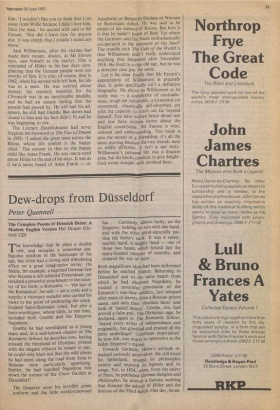SUMMER BOOKS
A stretcher case
John Braine
Henry: An Appreciation of Henry William- son Daniel Farson (Michael Joseph £8.95) When I first met Henry Williamson in 1947, I was less than enchanted. He had come to Bradford to speak to the Brad- ford English Society, something which puzzles me still. Why should he have driven some 300 miles to speak to 60 people? It wasn't as if the Bradford English Society had a national reputation, and he certainly wouldn't have been paid more than his ex- penses.
He was a handsome man, spare and tense, with greying hair and a neatly trimm- ed moustache. He didn't look in the least like a writer. Writers, I was aware even then at the age of 25, all have the same expres- sion: frightened, vulnerable, but keenly in- quisitive. They're painfully interested in what's happening all around them, even though they can very rarely make any sense out of it. Williamson looked every inch the soldier. His face was on the attack. In fact, he was somehow giving orders. And he didn't look at ease in his rather good tweeds, but very much in mufti.
All this, of course, added to his glamour. He drove up to the Bradford Civic Playhouse, the venue of his talk, in his Alvis Silver Eagle, a beautiful pre-war sports car with an incredibly long bonnet and sweeping wings. It had actually oiled its plugs and made peculiar noises all the way; it was a superb piece of craftsmanship, but essentially a rich man's toy, needing almost daily maintenance. However, it suited Williamson. Not that it would have mat- tered to me what kind of car he came in: he was a professional writer, a godlike figure.
Up to this moment I have total recall. Then it becomes intermittent. I remember scarcely any of his talk. I listened — I would have listened if he'd read out of the Bradford telephone directory. Because he was there in the flesh, I could concentrate my thoughts upon what he'd written. I had in mind principally The Flax of Dream se- quence; I admired Tarka the Otter but it didn't point in the direction I wanted to go.
What exactly I wanted from Williamson's talk it is difficult 35 years later to say. Clueless though I was then, I knew his faults as a writer. His dialogue could be extremely stilted, he very often had a tin ear, he often just didn't seem to be aware how people actually speak. His prose could be nauseatingly lush and overblown. He seemed to have no discipline or restraint. Not that he was incoherent. But his raids upon the inarticulate were conducted on the First World War attrition principle: he poured the words in until he'd won. There were too many casualties. However, I didn't, that evening in 1947, bother all that much about his faults. What was important to me was his huge emo- tional vitality. His novels stayed in my mind. They still do. And I found his
autobiographical books like Goodbye West Country almost embarrassingly honest. What this all boiled down to that evening in 1947 was that I hoped to learn something from him about writing. I don't mean
helpful technical hints; simply that I needed nourishment, some kind of inspiration. I was there not only as a writer but as a reader.
In the event, what I got was 45 minutes of almost undiluted belly aching. It was boring and depressing. He even referred to his be- ing interned under Section 18(b) during the War; he was actually, as Mr Farson found out, under house arrest for a short while for his own protection. He also grumbled about not having been able to get enough petrol for his Alvis Silver Eagle. He uttered the words `Alvis Silver Eagle' with relish. Although he looked so completely an of- ficer and gentleman, he always, to use an old-fashioned phrase, showed the hairy heel. it was bad enough to expect us to care about his petrol ration; but he made it worse by gratuitously informing us that he owned a very superior car.
After the talk I went up to him and men- tioned how much I'd enjoyed what Malcolm Elwin had written about him. He glared at me. 'I don't give a curse what anyone writes about me,' he said, and turn- ed away. He wasn't telling the truth; because of his continued support for Sir Oswald Mosley he wasn't exactly a hot pro- perty. Elwin, though I'm sure that he detested Williamson's politics, helped to get the show on the road again. And he found a publisher for Williamson's supreme
achievement, the sequence A Chronicle of Ancient Sunlight. Williamson would have
been lost without him. And finally William- son quarrelled with him. It reminds one of the description of Mrs Patrick Campbell: a sinking ship firing upon her rescuers.
I wasn't unduly cast down by this en- counter. I was 25 and resilient, and had been born and bred in the West Riding, where charm is a commodity which is in short' supply. But it put me off his books for a long time. It wasn't even that he had the excuse of being drunk. Chance would have been a fine thing for any Bradford English Society speaker. Mr and Mrs Mac- donald, who ran it, were amiable and idealistic and completely devoid of but they really did believe in high thinking and plain living. Mr Farson records that Williamson got a pint of beer before his talk. He was exceptionally lucky.
I met him again some 20 years later at the Savage Club. He seemed to have shrunk. He was clean, well-dressed, sober and coherent, and still a handsome man, but the face that had before been on the attack was now in full retreat. I told him how honoured I was to meet the author of A Chronicle of Ancient Sunlight and in par- ticular commended the Great War volumes for their searing authenticity. He received this tribute impassively. I didn't expect him to roll over on his back with all four paws in the air, but I would have welcomed a rather warmer reaction.
My conclusion was that some writers put the best of themselves into their work, and there's not much left over. (As I grow older, I strongly suspect that this is what most people feel about me.) The outstand- ing virtue of Mr Farson's book is that it makes me regret that I didn't meet William- son again and do something to help him. Or, rather, to help his work to be given its proper due; I don't think that anyone, least of all me, could at any time in his life have straightened him out as a human being.
Mr Farson first met Williamson at his parents' house in Devon after the war. His father was Negley Farson, the American writer chiefly known for his best- selling The Way of a Transgressor. Negley Farson was pilloried in The Gale of the World (the last volume of A Chronicle of Ancient Sunlight) as Osgood Nilssen, a loud-mouthed boorish, drunken and mean- spirited American writer, author of a bestseller, Sinner's Way. (Williamson seem- ed to have been blithely unaware of the ex- istence of a law of libel.) The Gale of the World got it all wrong about Negley Farson. His worst fault was that he was an alcoholic, and extremely ob- noxious when in his cups. But from all ac- counts he was kind and generous and lov- ing: the person he hurt most was himself.
The reason for the Osgood Nilssen caricature (one can't call it a portrait) was that very often Negley Farson's drunken tirades were bang on target. He told people truths which they didn't want to hear. 'My father had a fatal knack of finding the Achilles heel and probing it. One story he related with relish concerned a remark that Henry had been rash enough to confide in him after Henry had eloped with the wife of a Savage Club member, who had told him: "Henry, there is no one I would rather she ran off with than you". "Yes." said my father cruelly, "and you know what he add- ed after you'd gone? Because my poor foolish wife will go through such hell with Henry that she'll come running back in a couple of weeks pleading for forgiveness." And she did!'
The fact was that both of Williamson's wives left him because he was impossible to live with. He was into old age extremely at- tractive to women. His line was a pas- sionately romantic and poetic chat-up followed by what Thurber categorised as the Sudden Pounce. Always his women left him, '1 wouldn't like you to think that I ran away from Willie because I didn't love him, bless the man,' his second wife said to Mr Farson. 'Nor did I leave him for anyone else. It was simply that I couldn't stand any more.'
And Williamson, after his victims had made their escape, always, as Mr Farson says, cast himself as the martyr. One is reminded of Hitler in his last days com- plaining that the German people were not worthy of him. It is true, of course, that in 1962, when his second wife left him, his life was in a mess. He was worried about money, his research material for the Chronicle was in an inextricable muddle, and he had an uneasy feeling that the parade had passed by. He still had his ad- mirers, he still had friends. But doors had closed to him and his face didn't fit and he was beginning to tire.
The Literary Establishment had never forgiven his foreword to The Flax of Dream in 1935: 'I salute the great man across the Rhine, whose life symbol is the happy child.' The answer to that is: the happy child like Anne Frank. He was starry-eyed about Hitler to the end of his days. It was as if he'd never heard of Anne Frank — or Auschwitz or Belsen or Dachau or Warsaw or Rotterdam either. He was said to be aware of the menace of Russia. But how is it that he hadn't heard of Babi Yar where the Germans and the Nazis enthusiastically co-operated in the massacre of the Jews? The trouble with The Gale of the World is that Williamson didn't really understand anything that happened after November 1918. He lived to a ripe old age, but he was a stretcher case just the same.
Let it be clear finally that Mr Farson's appreciation of Williamson is precisely that. It quite specifically isn't a definitive biography. He shows us Williamson as he really was — a complexity of contradic- tions, tough yet vulnerable, a tormentor yet tormented, chaotically self-absorbed yet with the capacity to reach out far beyond himself. Few have written better about war and few have written better about the English countryside. Mr Farson is wise, tolerant and understanding. This book is also the record of a friendship; it's all the more moving because the two friends were so wildly different. It isn't a sad story. Williamson's personal life was a disaster area, but his books continue to give delight. God writes straight with crooked lines.























































 Previous page
Previous page